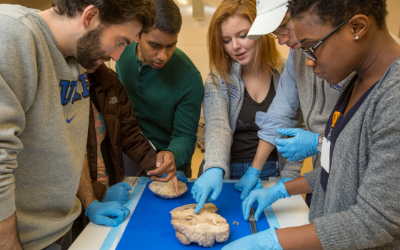
Our undergraduate medical education experience is built around a central goal to ensure the delivery of a cohesive behavioral health curriculum spanning through the MS1 through the MS4 experience.
Read on to learn about the opportunities available to medical students throughout their time at Duke.
The first year of medical school involves learning the basic sciences and applicable principles to help students prepare for their clinical experiences. The Department of Psychiatry & Behavioral Sciences presents the majority of our course content during the Body & Disease course in the spring of the MS1 year.
Human Structure & Function
The Human Structure and Function course integrates the disciplines of biochemistry, cell biology, genetics, physiology, histology, gross anatomy, embryology and the neurosciences. This core preclinical course focuses on the scientific principles underlying the structure and function of the human body, thereby providing the foundational knowledge for the practice of medicine and facilitating the incorporation of new scientific knowledge throughout the medical career. Topics pertaining to human disease and injury are incorporated into the curriculum to promote application of course material.
Body & Disease
The Body and Disease course emphasizes the complex interplay between neurological conditions and psychiatric symptoms. We provide educational content on both pharmacological and non-pharmacological interventions. Students are introduced to the biopsychosocial model of patient assessment in this course.
Psychiatry Clerkship
Geriatric Psychiatry Selective
Pediatric Psychiatry Selective

Learn more about Duke’s residency training programs in Psychiatry and Internal Medicine-Psychiatry.



